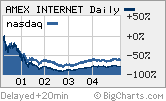 |
| The past five years have been tough for all tech investors...but even more so for owners of dot-coms. |
|
|
|
| * Data as of 3/09/05 | | Source: Thomson/Baseline |
|
|
|
|
NEW YORK (CNN/Money) – Let's take a stroll through the dot-com cemetery.
Here lies eToys, which went public in 1999 and went bankrupt in 2001. Ooh, look at the pretty flowers at the burial site of Garden.com, delisted in 2001. Let's have a moment of silence for MP3.com. Adios, QuePasa.com. We hardly knew ye.
But as we take time to remember the Net stocks that have fallen or are on life support (Theglobe.com (Research) and Salon Media (Research), to name a few) on the five-year anniversary of the Nasdaq's peak, it's worth noting that several Internet companies that appeared to be on the brink of extinction are now thriving.
Like the old man in "Monty Python and the Holy Grail," they're not dead...even though many thought they should be.
Stayin' alive
Priceline.com, Ask Jeeves, InfoSpace, Stamps.com and WebMD are just a few former darlings that have survived despite being written off several years ago.
Things were so bleak for Priceline (Research), InfoSpace (Research) and Stamps.com (Research) just a few years ago that they had to resort to reverse stock splits to resuscitate their flagging stock prices.
In a reverse stock split, companies reduce the number of shares outstanding, which drives the price of the stock up but doesn't change the value of the company. Reverse splits are often viewed as last gasp signs of desperation.
But all of these companies are expected to be profitable this year. Even better, many actually trade at bargain valuations.
"The biggest change in the past five years is that you can find very reasonably priced companies and most are making money. That's obviously a big change from the late 90's when these companies were just starting out," said Ryan Jacob, manager of the Jacob Internet fund, and himself a survivor of the dot-com implosion.
Look at WebMD (Research). It reported strong earnings on Tuesday and raised its guidance for 2005. The stock surged 20 percent as a result.
But before you start to cry bubble, consider this: WebMD trades at just 19 times consensus estimates for 2005. Investors seem to be behaving rationally, realizing that WebMD is merely a Web site for medical information. It's not going to cure cancer, AIDS and the common cold, and investors aren't valuing it as if it were.
Weeding out the weak
Jacob mentions Akamai Technologies (Research) as another example of a stock he owns that is a profitable Internet survivor with a compelling valuation.
Akamai, an Internet software company that helps speed up the delivery of online content, was a hot IPO back in 1999 but fell on hard times. But earnings are expected to increase by 57 percent this year and the stock trades for just 24 times 2005 estimates.
David DuChene, an analyst with Firsthand Funds, a mutual fund firm that specializes on technology stocks, also likes Akamai, saying that the rebound in online advertising has boosted fortunes for Akamai.
In addition, broadband access to the Internet, which was widely hyped in the late 1990s is finally a reality. So as more consumers download music and video content, then that should bode well for Akamai, DuChene said.
Consolidation also has helped the survivors get stronger. Competition is still fierce but the Net stocks that have survived aren't battling as many rivals as they once were.
Back in 1999, all companies seemed to need was a corporate name with an "e-" prefix and ".com" suffix (preferably both) to get venture capitalists to throw cash at them and investment banks to start salivating about taking them public.
"More Internet companies have turned profitable and have sustainable business models and a lot of that is due to the shakeout in the market. Five years ago there were a lot more competitors," said DuChene.
Two other stocks that Jacob owns in his fund have benefited directly from mergers. Online car buying service Autobytel (Research), for example, bought Autoweb, a competitor that also went public in the late 1990s.
And InfoSpace has scooped up several search-related companies while also branching out into the burgeoning business of wireless content, things such as downloadable ring tones and games.
DuChene added that Monster Worldwide (Research) (which I wrote about last week), VeriSign and Ask Jeeves are three other stocks that Firsthand owns in its Firsthand e-Commerce fund that he thinks are here to stay.
He said investors underestimate how much VeriSign (Research), which develops software that helps to make transactions over the Web secure, will benefit from the continued growth of online retailing. And Ask Jeeves (Research), despite being a small fish in the search pond, still stands to gain from favorable advertising trends in large part because it has a business relationship with Google that lasts until 2007.
So all in all, it looks like times are good again for many of the hot Internet stocks of the late 1990s. Investors just need to realize that none of these companies are likely to get back to the levels they traded at five years ago anytime soon. And considering how painful the post-bubble years were, that's not necessarily a bad thing.
For a look at more Internet stocks, click here.
For more about the markets, click here.
Sign up to receive the Tech Investor column by e-mail.
Plus, see more tech commentary and get the latest tech news.

|